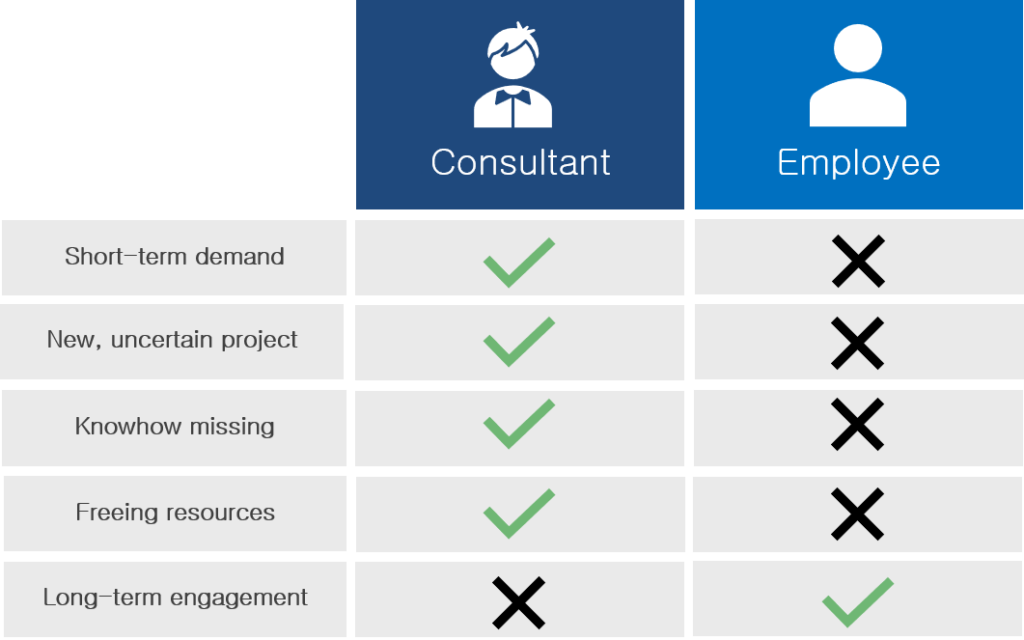why choosing a consultant over a regular employee
It is like a constant battle of thoughts. Should a company rather hire a consultant or aim for recruiting a regular employee? The simple answer here: it depends!
The difference of a consultant and an employee

The main difference is that a consultant does not belong to your company and thus, is an external workforce. Depending on the setup, the consultant works against a schedule and milestones or based on a contract and deliverables. An employee, on the other hand, is an internal workforce and thus, on the payroll of the company. The company is responsible for the employee and therefore can demand to work on topics within the contractual employee agreement.
Pro's of a consultant and an employee
The Pro’s of a consultant are evident. Consultants are usually highly motivated and experts in their field of work. Further, their onboarding time is, provided that are on a senior level, very short as they usually have been involved with many companies and in the business for a longer period of time. Thus, the consultants know exactly how to fastly pick up the processes and where to focus on to get the job done.
Employees have their Pro’s as well. Usually, employees are identifiying themselves with the company and developing a sense of “community” within the company. This emotional band let’s unleash an additional level or engagement and power.
Con's of consultants and employees
The Con’s of consultants are certainly the financial short-term impact and the potential loss of knowhow once the task has been concluded. The financial impact comes from subjectively higher costs impaired with a consultant as all the fees and social security costs have to be taken into account. In the end, a consultant’s costs are usually not too far away as for a regular employee with a surplus of about 10%. The loss of knowhow once the task has been concluded is a major risk an can endanger to continuous support or maintenance of a process, product or service.
On the other hand, hiring a regular employee is not all truth and beauty, neither. Potential con’s are the lack or commitment and costs impaired for sickness and vacation leaves. Regular employees, especially when felt wronged over a miss promotion or alike, can develop a lack of commitmment towards the employer. With that, the output of such an employee towards a goal is reduced. Further, payment cannot be suspended in cases of sickness or vacation leaves. Especially sickness leaves can account to a major cost driver if tacken excessively.
The result

Balancing the Pro’s and Con’s is highly dependent on the situation and the needed resources. In cases of a short-term demand or a demand of staffing a project immediately, consultants might be favourable over employees due to the short hiring period. Further, consultants might be favourable over regular employees for new and uncertain projects with limited knowhow in the company. Consultants are a very hlepful and precious source of knowhow especially in the cases in which the knowhow is not within the company.
By hiring a consultant, specific knowhow can be “bought” and when distributed accordingly, held within the company. Moreover, there are situations when operations and projects clash in regards to resources. Expanding resources fastly can be made easily by hiring external consultants and assigning them to the tasks. Even thoug there are many situations in which a consultant is just right, employees are the better choice when aiming for a long-term engagement. In long-term engagements, costs outweigh the benefit of a consultant and a company might be better off in increasing the permanent staff.
How avanti europe can help
The Experts of Avanti Europe support you in the LifeScience and in different settings, such as consultants, contractors, ad-interim staff, external project team or in a tailored setting.